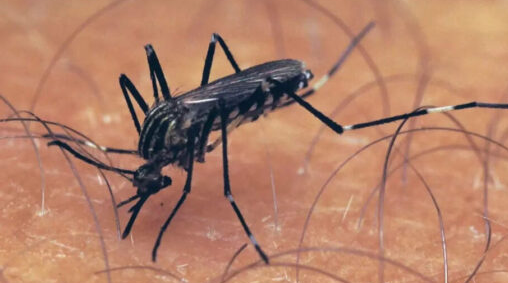
Most of the mild cases recover on their own, and do not need any further medical intervention. These symptoms usually start between 3 and 14 days after the mosquito bite, and can last for several weeks.Severe (Serious) SymptomsLess than 1 in 150 infected people (under 1%) will get severe symptoms. The severe symptoms are a result of the virus entering the brain and nervous system, which results in serious conditions like meningitis (swelling of the lining of the brain and spinal cord) or encephalitis (swelling of the brain).Serious signs include:High feverSevere headacheStiff neckDisorientation or confusionMuscle weakness or paralysisTremors or convulsions (shaking)Loss of consciousness or comaSensitivity to lightSeizuresThe risk of severe illness is high for the elderly people, people with weakened immune systems and those with chronic diseases. In rare cases, the infection can lead to permanent damage to the nervous or brain systems or can be deadly.Long-Term EffectsThe people who have had severe infections may experience some effects for months or even years, such as:Persistent tiredness or weaknessMemory problemsHeadachesTrouble with balance
How Is West Nile Virus DiagnosedDoctors usually diagnose West Nile virus by:Looking at symptomsAsking about recent mosquito exposureDoing blood tests or testing fluid from the spinal cord to check for the virus or antibodiesTreatment for West Nile VirusNo Specific MedicineThere is no cure or specific treatment for West Nile virus. Antibiotics are not used since the disease is caused by a virus not bacteria.For mild cases: Most people with mild symptoms will recover on their own. Doctors suggest:RestDrinking plenty of fluidsTaking over-the-counter pain relievers for fever and aches, such as acetaminophen or ibuprofenFor severe cases: People who have serious symptoms usually have to go to the hospital for supportive care while their body is fighting off the virus. This can include…Patients receive IV (intravenous) fluids for dehydration prevention purposes.PreventionSince a cure does not exist, it is crucial to minimise mosquito bites. This can be done by:Applying mosquito repellents that contain DEET or other authorized ingredients.Wear full sleeved clothes and pants from dusk to dawn, because mosquitoes become most active during these times.The application of screens to windows and doors, functions as an effective barrier against mosquito entry.You must eliminate all standing water from flower pots, buckets and tires throughout your home, since it enables mosquito breeding.SourcesCenters for Disease Control and Prevention (CDC)Johns Hopkins MedicineWorld Health Organization (WHO)Cleveland ClinicDisclaimer: This article is for informational purposes only and is not a substitute for medical advice